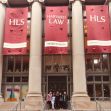In a time when seeking a college degree equates to willfully taking on long-term debt, the merits of formal education had already come into question before the pandemic. Recently, in the light of COVID-19 shutdowns, the U.S. university system has evoked more than the usual begrudging frustration from paying student bodies.
The University of San Diego (USD) has joined the ranks of schools nationwide facing federal class-action lawsuits after they switched to remote learning in response to the pandemic. In the rest of the state, similar litigation is challenging the extended branches comprising both California State University and the University of California, potentially affecting hundreds of thousands of students.
When the COVID-19 pandemic gained traction in the U.S., California was among the first to feel the impacts. In early spring, California suspended in-person learning and shuttered businesses statewide to contain the viral spread throughout communities. As the lockdowns stretched on with no clear end in sight, education that was always practiced in-person stepped optimistically—if clumsily—out of classrooms and lecture halls and onto computer screens.
The affected universities and colleges refunded room and board dues. Still, they continued charging tuition and fees according to the students’ standing contracts, despite shifting entirely to online learning in early spring.
The USD lawsuit claims that tuition is meant to pay for a “robust education and full experience of academic life on (University of San Diego)’s campus; remote online learning cannot provide the same values as in-person education.” They believe these values dissolved as soon as the dormitories, which housed over 2,500 students, were vacated in March.
Students assert that the tuition they pay—which frequently produces years of debt—is for more than mere class credits. However, the situation is, as a federal judge in Florida noted in a similar lawsuit, “novel,” with no legal precedent to navigate the disputes with ease.
The university’s existing online classes were already priced lower than their in-person counterparts, calling for a demand to offer tuition refunds based on discounted rates. The litigation doesn’t specify a dollar amount that should go to the students, but the online class fees may act as a guideline for schools like San Diego that offer them. Online petitions call for possibilities such as an annual tuition reduction of about $1,000 or a small percent refund for the spring semester (when COVID-19 restrictions had first driven the school empty).
Most of USD’s courses are fully remote in the current school year, though the campus remains partially open for limited programs and classes. Most university services, like the library, have also shifted online. Though students see the tuition as an unfairly opulent price to charge for an online degree, the school offered limited reassurance by reporting that some of the faculty had spent the summer training for the change.
The toll of the pandemic is still roiling, and neither schools nor students have evaded its consequences. The university, like many others, anticipates a rough economic fallout for its budget, potentially in the tens of millions. On the other hand, the students make up a collective body of individuals facing the financial burdens of a post-COVID-19 nation—a different experience than a private university’s budgeted millions, but still critical economic injuries.
California faces particular fiscal fallout in its collection of university lawsuits. The state’s schools (that are now in litigation) had together received close to $800 million in federal funding to float them through the mid-pandemic economic distress.
The future of the USD instance is uncertain, as parallel cases throughout the country have yet to cut any clear paths for the litigation. The direction of these lawsuits could help redefine components of the pricey higher-education system in America.






